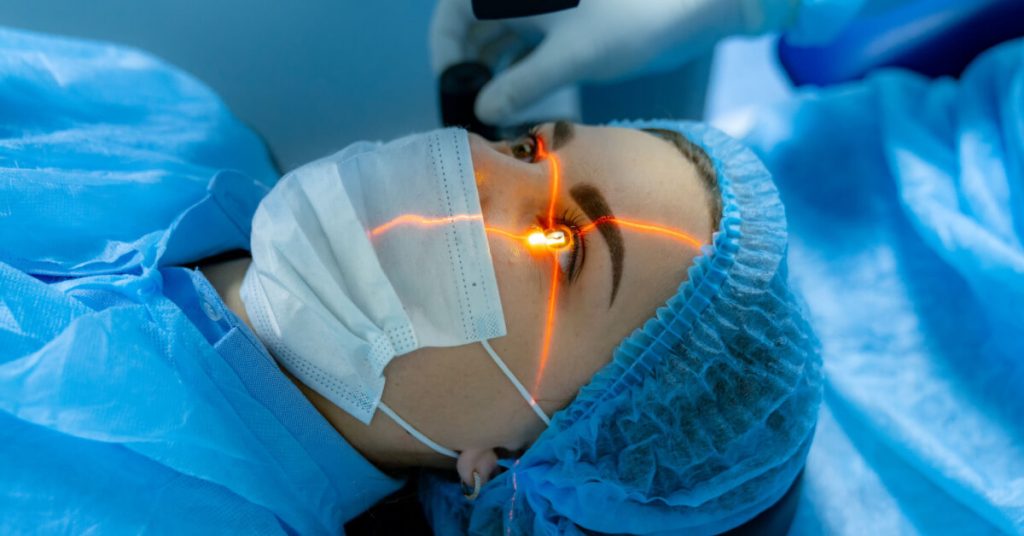Laser eye surgery, also known as refractive surgery, has gained popularity in recent years as a viable solution for correcting common vision problems such as nearsightedness, farsightedness, and astigmatism.
The procedure involves reshaping the cornea using laser technology to improve visual acuity. While laser eye surgery offers several benefits, it is important to consider both the advantages and disadvantages before making an informed decision.
In this article, we will explore the advantages and disadvantages of laser eye surgery to help you understand its potential benefits and risks.

Advantages of Laser Eye Surgery:
Improved Vision: The primary advantage of laser eye surgery is its ability to significantly improve vision. Many individuals experience a dramatic reduction in dependence on corrective lenses or, in some cases, become entirely glasses-free. The procedure aims to correct refractive errors, providing clearer and sharper vision.
Quick Results: Laser eye surgery offers quick results, often providing improved vision immediately or within a few days after the procedure. This quick recovery time allows individuals to resume their daily activities without extended downtime or disruption.
Long-Term Solution: Unlike eyeglasses or contact lenses, which require regular updates and replacements, laser eye surgery offers a long-term solution. Once the cornea is reshaped, the effects are typically permanent, reducing the need for ongoing maintenance or additional procedures.
Convenience and Freedom: One of the major advantages of laser eye surgery is the convenience and freedom it provides. Individuals no longer need to rely on glasses or contacts for daily activities, such as driving, sports, or work. This newfound freedom can improve quality of life and enhance self-confidence.
Enhanced Peripheral Vision: Some people experience an improvement in peripheral vision after laser eye surgery. This can be particularly beneficial for activities that require a wide field of vision, such as driving or playing sports.
Disadvantages of Laser Eye Surgery:
Potential Risks and Complications: While laser eye surgery is generally safe, there are potential risks and complications associated with the procedure. These include dry eyes, glare, halos, night vision problems, corneal infections, and vision loss. Although rare, it is essential to discuss these risks with your eye surgeon to make an informed decision.
Cost: Laser eye surgery can be expensive, and the cost varies depending on several factors, such as the surgeon’s expertise, the location of the clinic, and the technology used. Insurance coverage for the procedure is limited, making it a significant financial investment for many individuals.
Not Suitable for Everyone: Laser eye surgery is not suitable for everyone. Factors such as age, eye health, corneal thickness, and pre-existing eye conditions may disqualify individuals from undergoing the procedure. A thorough evaluation by an eye care professional is necessary to determine candidacy for laser eye surgery.
Temporary Discomfort and Recovery Period: After the surgery, individuals may experience temporary discomfort, including dry eyes, itching, and sensitivity to light. Additionally, there is a recovery period during which certain activities, such as swimming or intense physical exercise, should be avoided. It is important to follow post-operative instructions provided by the surgeon to ensure a successful recovery.
Potential Need for Enhancements: In some cases, the desired visual outcome may not be achieved with a single laser eye surgery procedure. Enhancements or touch-up surgeries may be necessary to achieve the desired level of vision correction. While enhancements are typically successful, they involve additional costs and recovery time.
Conclusion:
Laser eye surgery offers several advantages, including improved vision, quick results, long-term solutions, convenience, and freedom from glasses or contacts. However, it is important to consider the potential risks, cost, candidacy limitations, temporary discomfort, and the recovery period associated with the procedure.
Laser eye surgery is a decision that should be made after careful consideration, consultation with an eye care professional, and a thorough understanding of the advantages and disadvantages involved.
While many individuals have experienced life-changing improvements in their vision through laser eye surgery, it is crucial to weigh the potential risks and complications against the benefits. Understanding your individual circumstances, discussing your expectations with your eye surgeon, and being aware of the limitations and possible need for enhancements can help you make an informed decision.
Remember, every person’s eyes and visual needs are unique, so what may be advantageous for one individual may not be the best option for another. Consultation with a qualified eye care professional is essential to determine if you are a suitable candidate for laser eye surgery and to address any concerns or questions you may have.
Laser eye surgery has undoubtedly revolutionized vision correction, offering the possibility of reduced dependence on glasses or contact lenses. However, it is important to approach the decision with realistic expectations, a thorough understanding of the procedure, and careful consideration of the advantages and disadvantages specific to your situation.



